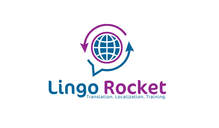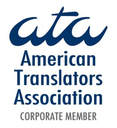LINGO ROCKET BLOG |
|
Why learn German?
For more information contact us at [email protected]. Prices: $35/class or $330 for a package of 10 classes.
0 Comments
Why learn Russian?
 An Apostille is a specialized document issued by The Secretary of State which is used to verify the authenticity of the original document. Apostilles are attached to notarized public documents (e.g. birth certificates, marriage certificates, diplomas, divorce decrees, and school transcripts.) Apostilles are typically required for getting married, applying to Universities, or adoptions in a foreign country. In all of the scenarios above you will need the original document, its translation, and the apostille. Lingo Rocket is happy assist you with the translation of birth certificates, death certificates, marriage certificates, single status affidavits, divorce decrees, power of attorney documents, notarized documents, business documents, and more! Please note, that apostille authentication is provided in addition to translation of your documents. To obtain an apostille in the state of Virginia please contact office of The Secretary of the Commonwealth at: [email protected] 804-692-0114 To avoid rejection of your apostille application please read the instructions and submit all of the necessary documentation. Below you can find common reasons for why your apostille request might be denied:
Albanian Arabic Bengali Bosnian Bulgarian Catalan Chinese (Simplified) Chinese (Traditional) Creole Croatian Czech Danish Dutch Farsi Finnish French French (Canadian) Georgian German Greek Gujarati Hebrew Hindi Hungarian Indonesian Italian Japanese Korean Norwegian Persian Polish Portuguese (Brazil) Portuguese (Portugal) Punjabi Romanian Russian Serbian Spanish Swedish Tagalog Turkish Ukrainian Urdu Uzbek Vietnamese  During my stay in Europe in the summer of 2022, I was amazed by how multilingual Europeans are. The proximity to their neighbors and multilingualism within certain European countries are big factors in Europeans' ability to speak multiple languages. Countries like Switzerland and Belgium have multiple national languages: French, German, Italian, and Romansh in Switzerland; and Dutch, French, and German in Belgium. With global tourism, globalization and cross-border commerce on the rise, we also see a spike in the interest in foreign languages in The US. Spanish takes first place when it comes to being the most studied foreign language in the US, closely followed by French. French is the most popular language to study in the UK. Most popular languages in the EU are English, French, German, Italian, and Russian. It is also very important to mention that Mandarin Chinese and Japanese are the fastest growing languages to study in the world. The popularity of anime and China's role in the global market are two big factors in the rise of those two languages. Tell us what languages you speak and want to master one day!  World Kid Lit Month has been celebrated every September since 2016. The goal for the celebration is to promote world literature for children and teens. According to Alexandra Buchler, the director of Literature Across Frontiers: "By reading beyond our borders we explore the vast diversity of voices and perspectives that complement and contrast with our own. Global Kid Lit offers a window onto the world and a reflection of other cultures, but also expands the opportunities for children to find the texts that speak personally to them." This year Armchair Travel, Bibliodiversity, Global Reads for a Global Outlook, and Found n Translation were the four main threads. Here is how you can support World Kid Lit Month next year:
 Modern-day technology allows you to learn a new language without leaving the comfort of your own home. However, is learning a language enough to never experience problems when traveling across the globe? While learning a new language is a great start, it is not quite enough to communicate effectively across cultures. Understanding nuances of languages, cultures, and societal norms will make you a successful cross-cultural ambassador. One of the most surprising pitfalls of intercultural communication is the way we express our refusal. For example, refusing politely and waiting until the other person insists is a cultural norm in the Middle East, Thailand, and Japan. It is also a norm in those countries to sugarcoat the message before giving any feedback. At the same time, in Germany, for instance, people expect you to be very direct when giving any kind of criticism or feedback. To make things even more complicated, while a nod of the head in most cultures is an equivalent to saying “yes”, in Balkan countries such as Bulgaria and Albania a single nod of the head up (not down) actually indicates a ‘no’. Furthermore, in Bulgaria shaking your head sideways actually means ‘yes, I agree’. To summarize, here are some tips to avoid miscommunication across cultures:
 It is undeniable that communicating with business partners and clients in their native language will help you close more deals successfully. However, with over 6,000 languages around the globe, how do you choose the language to focus on? What language will be the best choice for your career? Companies always value bi-lingual employees. You will receive an estimated 2% return on your investment for learning a foreign language. At the same time, Spanish has a return rate of 1.4 percent while German offers as high of a return as 3.8 percent. However, that’s not just a bigger salary; knowing another country’s language means you have a better chance of succeeding in business as a whole. You show your partners and clients that you care. One of the best advice you can get when it comes to language learning is the importance of immersing yourself into the culture as well. Being able to see outside of your cultural limitations will help you to relate to people and make you a better business person. Here are five languages we think will yield success in your business: 1. German While Japan and China may have the highest gross domestic product, their languages do not top the list. A high GDP does not correlate to higher earnings necessarily. Think like a business person. Consider the open economies of the world and which powerhouses have the most open economies. Germany makes up one of the three economic European powerhouses. So learning German will benefit an outside more economically than the language of a closed economy. 2. French About 300 million people in 29 countries speak French. You can easily see why it ranks second among the languages you need to learn to succeed in business. Initially, you may think that only French people in France speak French. However, when you know French, you can work with French companies in France and the many other French-speaking countries. Canada, Switzerland, Belgium, and North and sub-Saharan Africa all boast of this language as one of their main languages. Furthermore, France has the fifth-biggest economy. You would do well to partner with a French company. At first glance, French may appear to be spoken by only those living in France. But it happens to be the second most widely learned language after English. Knowing how to speak French opens the doors to French companies in France, and other French-speaking countries such as Canada, Switzerland, Belgium, and North and sub-Saharan Africa. As the world’s fifth-biggest economy and number-three destination for foreign investment, France is a key economic partner. If you’re looking to earn your Master’s degree, learn French. Students who can speak French are eligible for scholarship opportunities at some of Europe’s most renowned universities. 3. Spanish One of the easiest languages to learn, Spanish has graced the American school curriculum for decades. Twenty countries have Spanish as their primary language. So knowing Spanish will expand your business opportunities. Over 400 million people speak Spanish worldwide. Furthermore, countries like Mexico, Chile, and Columbia heave healthy, growing economies. You will want to have the ability to do business with companies in these healthy economies. Courses like Lingvist’s Spanish course will help you master Spanish quickly and thoroughly. 4. Mandarin China has the world’s new dominant economy. Plus, it has over a billion people you can work with. Learning even the basics of Mandarin will help you conduct basic communication with Chinese business partners. Unfortunately, Mandarin is a complicated language to learn. Thus, if you plan on tackling this language, plan on spending some time mastering it. 5. Arabic The 2018 gross domestic product of the Arab world was over $2.7 trillion. The Middle East hosts an abundance of market opportunities. Thus Arabic speakers carry a big advantage over those who cannot speak this difficult language. Like Mandarin, Arabic takes time to learn. It has inflections much different from English which may be why so many English speakers do not tackle it. But from a business perspective, learning Arabic makes sense. Source: The Daily Campus
 Today like never before we see more and more language immersion schools opening throughout the US. This year more students than ever will receive instructions in more than one language. There has been a noticeable growth when it comes to the language schools enrollment, particularly schools that have instructions in Spanish, French, Russian, and Mandarin Chinese. This year more than 3,000 dual-language schools opened their doors to student, which is a significant increase from 2, 000 schools in 2018 and 260 schools in 2000. Advantages of language immersion schools:
 A notarized translation is a translation signed in front of a public notary. A Notary Public is a public servant appointed by state government to witness the signing of important documents and administer oaths. There are notaries available in every state in the US, and many can also do home signing. In most cases notaries do not verify the accuracy of translation but rather stand as a witness to the work completion. It’s important to know that public notaries are prohibited by law to make any changes to the translation or to give legal advice. There are many reasons you may need to have a document notarized. Documents are notarized to deter fraud and to ensure they are properly executed. An impartial witness (the Notary) identifies signers to screen out impostors and to make sure they have entered into agreements knowingly and willingly. Below are instances when you will need a notarized English translation:
 Idioms give a language its true character. If used correctly, idioms relay messages that instantly draw your audience's attention. Take a look at some of our favorite international idioms below and see if they can be implemented into your vocabulary. German: Tie a bear to someone. "Tying a bear to someone" means playing a prank on someone. Ex. "Good job tying a bear on your teacher with the homework excuse." Japanese: My cheeks are falling off. "My cheeks are falling off" is an equivalent of "this is delicious!" Ex. "This soup is so good, my cheeks are falling off." Dutch: Have hair on your teeth. "Having hair on your teeth" means being self-assertive. Ex. "Jake will be a great public speaker. He always has hair on his teeth." Polish: Mustard after lunch. "Mustard after lunch" refers to "missing a window" or when it's too late to do something. Ex. "I've already submitted your final grade. Your project is mustard after lunch." |
|
|



 RSS Feed
RSS Feed

